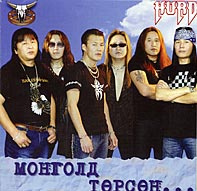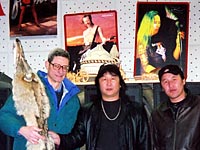|
|
2004.11.18 |
|
By: RFA Executive Editor, Dan Southerland |
| |
 |
|
| |
|
|
The Mongolian rock band Hurd on the cover of thier latest
album Photo: Hurd |
| |
|
 |
|
| |
|
|
(left to right) Dan Southernland, RFA executive editor,
Damba Gangbayar, band leader, Damba Otgonbayar, guitarist |
|
| |
|
ULAN
BATOR, Mongolia—Much as China’s emperors built the Great
Wall to keep out Mongol invaders, the country’s ruling
Communists are now trying to repulse a Mongolian cultural
invasion—rock music evoking the nationalistic spirit of Genghis
Khan.
In late
October, Chinese officials told organizers of a series of rock
concerts in the Inner Mongolian Autonomous Region of northern
China that the concerts had been cancelled. They gave no reason,
but hundreds of police showed up at a university campus where
the first concert was to be held in the Inner Mongolia capital
Hohhot.
Members
of Mongolia’s most popular rock group, Hurd—which roughly
translates as “Speed”—were preparing to leave the Outer
Mongolian capital, Ulan Bator, to give a first concert on Oct.
30 when they learned the performance had been canceled.
Friends
of the band in Inner Mongolia said Chinese authorities feared
the band might inflame nationalistic sentiments among young
ethnic Mongolians if the performance went on as scheduled.
Rising tensions
Media
reports have linked the Hurd to the Darhad, a Mongol tribe at
the vanguard of protests against government plans to privatize
the mausoleum of Genghis Khan in Ordos in western Inner
Mongolia. Under the new “redevelopment” plan, Chinese
businessmen would begin taking profits from the tourist business
controlled for centuries by the Darhad.
The
Hurd deny that they belong to the Darhad tribe. But tensions
have been rising for weeks between Mongolians and Han Chinese
over the privatization plan, and Chinese officials appear to
have feared the band’s nationalistic lyrics might inflame the
situation further.
The
Mongolian Darhad tribe was assigned hundreds of years ago to
guard Genghis Khan relics, such as a wooden bow the conqueror
left behind in Inner Mongolia.
Threatened with a loss of business, the Darhads took their story
to the outside world through the New York-based Southern
Mongolian Human Rights Information Center. At the same time,
Mongolian University students in Inner Mongolia began to express
sympathy for the Darhads’ cause.
Hurd
members had little to say about all this. But they denied
reports that they were members of the Darhad tribe. They said
that they hope to be admitted once again to Inner Mongolia,
which buys more of their tapes and CDs than Outer Mongolia.
The
Hurd have visited Inner Mongolia three times since 2000 and each
year the Chinese appeared to grow more relaxed about their
music.
“In the
beginning there was a lot of censorship,” said Damba Ganbayar,
42, keyboard player, producer and leader of the band. “They
asked us to translate all of the songs … and then they banned
some of them.”
Nationalistic lyrics
Inner
Mongolian youths told the band members that their music helped
them to preserve their native language, he said. Sometimes, he
added, a member of the audience would leap up and shout, “I am a
Mongolian!” or simply “Genghis!”
The
band was advised not to say things such as “We Mongols are all
together” or “All Mongolians rise up and shout!” The Chinese
authorities also advised members of Hurd not to encourage any
audience participation to avoid getting the crowd overly
excited.
By
international rock standards, the Hurd’s music seems relatively
mild—with lyrics that strike a non-Mongolian listener as sweet
rather than angry. But it’s undeniably nationalistic. And that’s
most likely what worried the Chinese authorities.
One of
the group’s popular songs, “Born in Mongolia,” describes a vast
“land of great legendary heroes,” a land “without borders,” and
a land bearing the “stamp of Heaven.” Not something that would
blow the roof off in most rock ‘n’ roll strongholds around the
world. But perhaps enough to frighten a Chinese official or
police officer trying to extinguish the flames of ethnic
nationalism.
|





